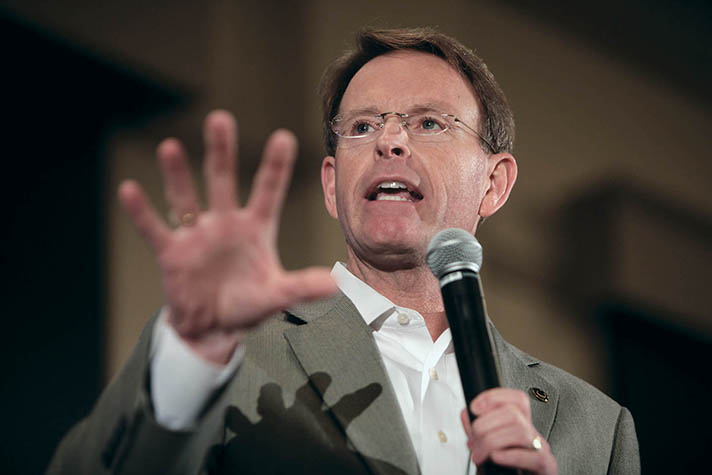
Tony Perkins gets indignant when he thinks about Christians refusing to vote for either of the two major party presidential candidates because they believe both are undesirable.
“I want to go into some of our churches and overturn a few tables because we probably had the best selection of primary candidates in the history of presidential politics,” said Perkins, president of the Family Research Council. “Half of them were born-again, Bible-believing, evangelical Christians.
“But many people didn’t get involved in those primaries and sat back to see what would happen, so the conservative vote got chopped up and split in many different directions. I don’t think they have a lot of room to complain when the choices for the general election are not the best ones. I’m not sympathetic, and it doesn’t absolve us from the obligation we have to vote. It’s part of being salt and light.”
Voting for a third-party candidate, or writing in someone not on the ballot, does nothing to address the dire state of the nation, according to Perkins.
“We’re a two-party system in this country,” he said. “We may not like it, but that’s a reality. A third-party candidate is not going to win. The reality is that one of the candidates representing the two major parties is going to be elected president—period.”
Perkins said electing Democratic nominee Hillary Clinton will result in “four more years of liberal anti-family, anti-faith policies that we’ve seen under [President] Barack Obama.” At the same time, he acknowledged that there are many unknowns with Republican nominee Donald Trump.
Trump, a career businessman and entrepreneur, “has not spent his adult life thinking about public policy or any kind of ideologically driven agenda,” Perkins said.
“He’s just not been engaged. But I can say firsthand from my interaction with him that he’s not hostile to conservative ideas. He is open, even though he hasn’t thought through these things, so if you can help him connect the dots, I think he’s willing to learn and listen.”
Perkins can relate to believers who are unsettled about character issues with Clinton and Trump. “Both have significant problems,” he said.
In his years as a Louisiana state representative, Perkins fought diligently against legalized gambling, yet Trump is a casino owner who has made millions from that industry.
“Pretty much everything I have stood for is in contrast to what Donald Trump has done in the past,” Perkins said. “Now the question is: What would he do going forward?”
Perkins was among more than 900 evangelical leaders who attended a June 21 meeting with Trump in New York City. There has been skepticism about the gathering, partly due to questions about whether Trump was merely trying to charm a major voting bloc.
“Nobody can know another man’s heart,” Perkins said. “But he was willing to meet with us.”
Perkins said a more important question about the meeting is what was—and is—the motive of the church leaders.
“Our role is not to get a seat at the table,” Perkins said. “We’re not a special interest group that simply wants our boxes checked. We are a prophetic voice to those in power reminding them that they, like us, are held to a higher standard of accountability. We present transcendent truth that no vote can overturn, that no man can avoid.”
Perkins believes it’s time for the church, for all believers, to take a brutally honest self-inventory and repent for years of apathy and compromise.
“In many ways, the reason we’re where we are as a nation—and the reason we have the candidate choices that we have—is because we have failed,” he said. “The church in America has been in retreat. If we do not stand up and exercise our freedom to protect our freedom, I see a spiritual dark age descending upon us.”
Though only God can turn America around, Perkins said this election will have a major impact on whether or not the country can regain its moral standing.
“Our problem is not political, it’s spiritual,” he said. “We’ve got to get our spiritual state in order. But part of that is making a political choice in this election that will either give us the breathing room to get it right or it will make it even more difficult for Christians to collectively be a faithful public witness in this country.
“This is not a time to stand on the sidelines.” ©2016 BGEA
